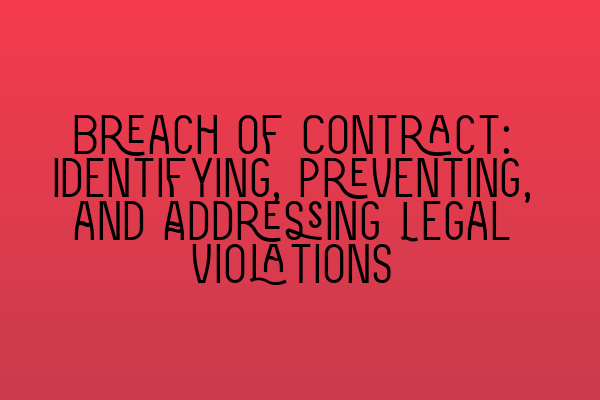Breach of Contract: Identifying, Preventing, and Addressing Legal Violations
Welcome to our blog post on breach of contract. In the realm of contract law, a breach occurs when one party fails to fulfill their obligations under the terms and conditions of the contract. It’s an unfortunate situation that can lead to disputes, financial loss, and damaged reputation for the parties involved. In this article, we will explore the key aspects of breach of contract, how to identify it, steps to prevent it, and the legal measures to address the violations.
Identifying Breach of Contract
Before diving into the realm of preventing and addressing breaches of contract, it’s essential to understand how to identify them. A breach can take many forms, such as:
- Failure to deliver goods or services as promised
- Non-payment or late payment for products or services
- Failure to meet quality standards or specifications
- Violation of confidentiality or non-disclosure agreements
- Failure to perform within the agreed-upon timeframe
- Changing the terms of the contract without mutual agreement
These are just a few examples, and each contract may have its own specific clauses and terms that can be breached. It’s crucial to carefully review the contract to determine if a breach has occurred.
Preventing Breach of Contract
While breaches of contract can be highly disruptive, they are not inevitable. Taking proactive steps to prevent breaches can save you time, money, and potential legal headaches. Here are some preventive measures to consider:
- Clear and Detailed Contract: Ensure that your contract clearly outlines the obligations and responsibilities of each party. Leaving room for ambiguity can increase the risk of misunderstandings and subsequent breaches.
- Thorough Due Diligence: Before entering into a contract, conduct thorough research and due diligence on the other party. This includes verifying their reputation, financial stability, and track record of fulfilling their contractual obligations.
- Mediation and Dispute Resolution Clauses: Including mediation or alternative dispute resolution clauses in your contract can help resolve conflicts without resorting to costly and time-consuming litigation.
- Regular Communication and Documentation: Maintaining open lines of communication and documenting all conversations, changes, and updates related to the contract can help prevent misunderstandings and provide evidence if disputes arise.
- Periodic Review and Amendment: Review your contracts periodically to ensure they remain relevant and reflect any changes in the business environment or legal landscape.
By implementing these preventive strategies, you can significantly reduce the likelihood of a breach of contract.
Addressing Breach of Contract
Despite taking all the necessary precautions, breaches of contract can still occur. In such cases, it’s crucial to know how to address the violations effectively. Here are some steps to consider:
- Review the Contract: Carefully review the terms and conditions of the contract to confirm the existence and nature of the breach.
- Communication: Initiate communication with the breaching party to discuss the issue and explore potential resolutions. Sometimes, misunderstandings or genuine mistakes can be rectified through open and honest dialogue.
- Notification of Breach: If informal communication fails, formally notify the breaching party in writing about the breach and the desired course of action, such as demanding performance, termination, or seeking compensation.
- Seek Legal Advice: Consult with a qualified contract attorney to understand your legal options and receive guidance on how to proceed. They can help you navigate the complexities of contract law and protect your rights.
- Negotiation or Mediation: In some cases, it may be possible to resolve the breach through negotiation or mediation. These methods can help both parties find a mutually acceptable solution while saving time and expenses compared to litigation.
- Litigation: If all other attempts fail or the breach causes significant harm, litigation may be necessary. Your attorney will represent your interests in court, presenting your case and seeking appropriate remedies.
Remember, the specific steps to address a breach will depend on the circumstances, the contract terms, and applicable laws. Consulting with a legal professional is crucial to ensure you follow the correct legal process.
By understanding how to identify, prevent, and address breaches of contract, you can protect your business interests and maintain strong relationships with your contractual partners. If you need further assistance or guidance in contract law or other legal matters, our team at SQE Contract Law is here to help.
Related Articles:
